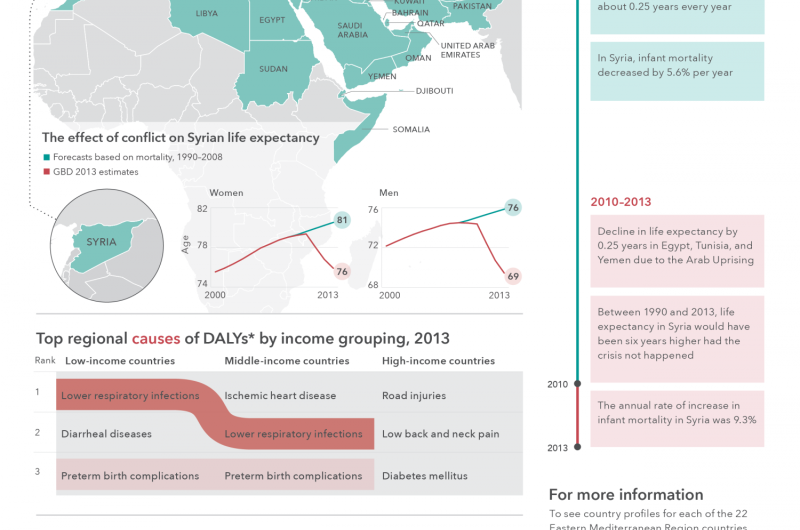Conflicts subverting improved health conditions in Eastern Mediterranean Region

Improved health conditions and life expectancy over the past 20 years in the Eastern Mediterranean Region are being subverted by wars and civil unrest, according to a new scientific study.
Conflicts have destroyed infrastructures in several nations, and with inadequate water and sanitation systems in some countries, there is "an immediate need" to ensure outbreaks and illnesses are properly controlled. Moreover, many physicians and health professionals are fleeing their home countries in search of stability and safety, taking their talent and expertise needed to help rebuild inadequate health systems.
The study points to a critical need to address these issues so that people affected receive adequate health and medical services, and that infrastructures are rebuilt to prevent disease-spreading conditions.
"The Eastern Mediterranean Region needs attention in this critical health phase," said IHME Director for Middle Eastern Initiatives Dr. Ali Mokdad. "In the past decade the region has experienced improved health and life expectancy, but recent distress in the region will result in deteriorating health conditions in these countries for many years to come."
Uprisings in Syria, Yemen, Egypt, Libya, and Tunisia caused a drop in life expectancy from 2010 onward. Specifically, in Syria life expectancy would have been six years higher without the war. Moreover, Syria saw an increase in infant and maternal mortality, the only country in the region to see this trend.
In addition, conflicts in the region have displaced millions of people. Outbreaks of infectious diseases in camps with poor sanitation and lack of immunization services burden the health of refugees and pose major obstacles to public health efforts, Dr. Mokdad said. Frequent attacks on vaccination teams have greatly slowed immunization campaigns, and polio has again become a major concern, especially in refugee camps, at a time when the region was close to eradicating it.
The study examines 22 nations in Central Asia, the Middle East, and North Africa between 1990 and 2013. It is based on findings from the Global Burden of Diseases, Injuries, and Risk Factors Study (GBD) coordinated by the Institute for Health Metrics and Evaluation (IHME) at the University of Washington in Seattle. With more than 1,700 collaborators in 124 countries, the GBD is the largest and most comprehensive effort measuring epidemiological levels and trends worldwide.
The paper, published today in The Lancet Global Health, also finds that chronic diseases, such as ischemic heart disease and diabetes, cause a greater burden to health in the region overall than communicable diseases like diarrheal diseases and tuberculosis.
Years of good health lost to communicable, maternal, neonatal, and nutritional disorders dropped from 109 million to 73 million from 1990 to 2013. This is consistent with a similar global shift.
Childhood wasting was cited as the leading health risk in low-income countries, such as Somalia, Afghanistan, and Yemen. In the region's high- and middle-income countries, non-communicable diseases were the leading factors.
Overall life expectancy increased from 65 years in 1990 to 71 years in 2013, a sign of general progress in the region. Qatar revealed the highest life expectancy at 81 years for men and 83 years for women, but not all countries showed such promising results, especially in areas riven by conflict.
The study also notes annual mass pilgrimages by Muslims to Saudi Arabia and Iraq as sources of outbreaks. This year, Hajj, the pilgrimage to Mecca, begins September 9, bringing with it opportunity for outbreaks due to the number of travelers. Moreover, the region has seen new emerging infectious diseases such as the Middle East Respiratory Syndrome, in which patients develop severe acute respiratory illness.
Across the region, mental health and drug use disorders have increased significantly since 1990 and have taken a greater toll. In 2013, they caused 7.3% of premature death and illness, nearly doubling from 3.9% in 1990. Unfortunately, this rise has not been met with investment in prevention by most countries; it is largely overlooked by domestic health ministries, international agencies, and insurance systems, Dr. Mokdad said.
"The rise of non-communicable diseases and challenges like mental health and drug use disorders requires new approaches, skills, and prevention efforts," he said. "Nations must invest in health infrastructure and information systems now to stave off even worse health conditions in the future. These investments would impact not only the region but the rest of the world."
Finally, traffic injuries represent a "worrisome trend," and in high-income countries they are the leading cause of years lost or lived with disabilities. "This bears grave economic implications, as men in this part of the world tend to be the primary breadwinners of the family," the report states. In lower-income countries, where such injuries also pose serious problems, families often are impoverished from the loss of household income.
The report, "Health in times of uncertainty: Burden of diseases, injuries, and risk factors in the Eastern Mediterranean Region, 1990-2013," also notes environmental challenges in the region. Climate change has resulted in increased temperatures, and a major portion of the area is projected to be uninhabitable in the future. In addition, water shortages are a major threat to health and security in many Eastern Mediterranean countries.
The study examines Afghanistan, Arab Republic of Egypt, Bahrain, Djibouti, Iraq, Islamic Republic of Iran, Jordan, Kingdom of Saudi Arabia, Kuwait, Lebanon, Libya, Morocco, Oman, Pakistan, Palestine, Qatar, Republic of Yemen, Somalia, Sudan, Syrian Arab Republic, Tunisia, and the United Arab Emirates.
More information: The Lancet Global Health, DOI: 10.1016/S2214-109X(16)30168-1



















